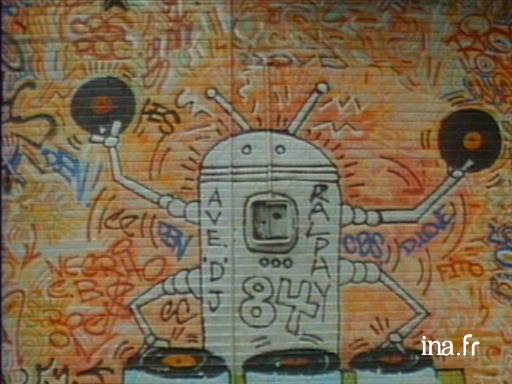New York, New York, the big Apple, the history of Hip-hop

Information
Filmed in New York, this report (with its many special effects) looks at the Zulu Nation, founded in New York in the early 1970s, and the origin of hip hop culture. The journalist Bernard Zechri interviews Afrika Bambataa, Bronx disc jockey, and creator of the Zulu Nation, an organization that brings together artists who express themselves through break dance, rap and graffiti art.
Context
Afrika Bambaataa, the King of the Zulu Nation
Everyone, even the new hip-hop generation looks to him, Afrika Bambaataa, an American black rapper, born in the Bronx. In 1963, when he was a member of the gang Black Spades, there was one film that particularly made an impression on him. It was the film Shaka Zulu starring Michael Caine, in reference to a Zulu King who fought against British colonization. In 1973 in the ghetto by the Bronx River, he created his first group Organization, which brought together key figures and dancers of the hip-hop movement. He also laid out its ethical foundations. In January 1975, his best friend Soulski was killed following a shoot-out where the police intervened in a brawl between the Black Spades and another gang. Afrika Bambaataa left his gang and then decided to reinforce the values of the Organization by renaming it Zulu Nation. Distancing himself from using violence as a form of expression, he brought together young peace-loving individuals who liked to dance, spray graffiti and practise the Djing. Coming to the defence of the oppressed, as he says in this report, the DJ and the other four founding members of the group recruit others; and the hip-hop movement went international. For example, the French DJ Dee Nasty is one of its famous members. Since then, each year, the Universal Zulu Nation has celebrated its anniversary by organizing an evening dedicated to James Brown and to Sly Stone in New York, reviving the legendary nights at the Roxy in New York.
The Zulu Nation is a federation of artists, mainly stemming from recent migration, but it also a way to shelter youths who come from the ghettos from deadly violence. Even if the organisation is founded on certain principles in order to prevent illicit behaviour (including the selling and consumption of hard drugs), it is far from being a catholic manual. Nobody takes a vow of chastity or poverty. Afrika Bambaataa has sold millions of albums. You also note in the documentary that graffiti quickly finds a place in galleries, just as rap found its own music labels. Dance continued to be, as it was everywhere else, the poorer brother.
By way of summary, a note by its founders: "the Universal Zulu Nation is not a cult, nor a club where you are forced to be a member, or an elite within hip-hop culture nor a for-profit business, nor a music or dance group.
A Zulu is not a non-smoker, nor a tee-totaler, nor someone who is more or less virtuous than the average person».





